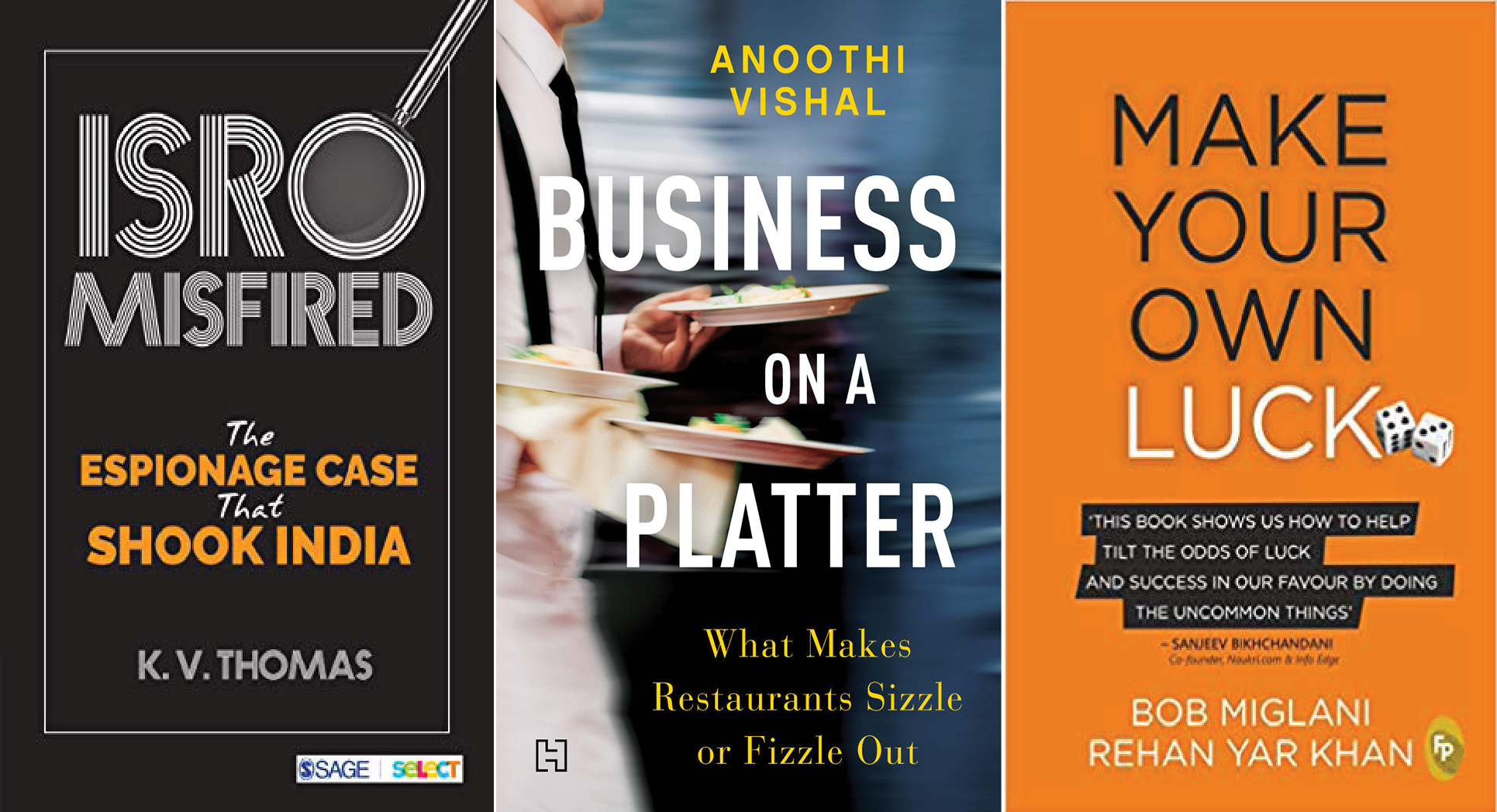1

IANS
Books this Weekend
Read about a case in which a top ISRO scientist, S. Nambi Narayanan was charged with spying but was eventually exonerated and awarded Rs 50 lakh for being "unnecessarily arrested and harassed"; delve into the secrets of what makes a restaurant tick while others fall by the wayside; and finally, learn how to turn the odds in your favour.
The IANS bookshelf gives you much to mull over this weekend. Enlighten yourself!
ISRO Misfired - The Espionage Case That Shook India
Author: K.V. Thomas; Publisher: Sage/Select; Pages: 193; Price: Rs 450.
This book is a "clarion call to the civil society of Kerala that in sensational issues, it should not be carried away by motivated propaganda. In this electronic era when the news and images instantly spread through social media such as WhatsApp and Facebook, verifying the veracity of any claims made by anyone including the people in power has become very crucial," writes the author, an ex-IB officer who was associated at various stages with the ISRO case.
It began in October 1994, with the Kerala Police arresting Maldivian national Mariam Rasheeda for overstaying her visa. She was later charged with obtaining drawings of ISRO rocket engines. Nambi Narayanan, the director of ISRO's cryogenic project, D. Sasikumaran, a deputy director of ISRO, K. Chandrasekhar, the Indian representative of the Russian space agency, S.K. Sharma, a labour contractor and Fousiya Hasan, a Maldivian friend of Rasheeda, were arrested a month later.
In 1996, the CBI, which had taken over the case, told the Kerala High Court there was no substance in the charges and the case was closed. The Supreme Court awarded Nambi Narayanan the compensation in September 2018 after a prolonged battle.
"The fundamentals of interrogation techniques were flouted. Interrogation teams with every Tom, Dick and Harry who were bereft of professional skills or basic knowledge on space technology were hurriedly constituted to question senior space scientists of international reputation," Thomas writes.
This book should be essential reading for police officers at all levels.
Business On A Platter - What Makes Restaurants Sizzle or Fizzle Out
Author: Anoothi Vishal; Publisher: Hachette; Pages 262; Price: Rs 550.
"Indian restaurants have come a very long way from the time they were the haunts primarily of travellers, the working class, poets and drunks, as well as adventurous, sneaking students, and in general were frowned upon by the 'respectable' middle class that ate at home.
"Today, eating out is such a huge part of our youth culture that it is difficult to imagine life without being able to frequent a restaurant at least once or twice a week," says Anoothi Vishal, who has been writing on the food sector for over two decades and is the founder of Great Delhi Pop-Up, an umbrella under which she creates unique and immersive food experiences.
Along with profiles of chefs and restaurateurs like A.D. Singh, Ritu Dalmia, Gauri Devidayal, Riyaz Amlani, Regi Mathew and Camellia Panjabi, Vishal decodes the journeys of many popular restaurants - from long-surviving food chains to the newest boutique outlet on the block.
Noting that even as the tricky Indian marketplace continues with all its contradictions and challenges by way of frequently changing regulatory environment, rents and so on, "there is room today for all kinds of restaurants" and savvy restaurateurs will be able to find an audience, the book says.
"If they are fiscally prudent, clear and consistent in their execution...they will be able to stand out and create a beloved brand. It's easier said than done, but not an impossible recipe to cook," Vishal concludes.
The book is a handy guide for those venturing into the sector while existing players can learn much from the successes and failures of the competition.
Make Your Own Luck
Authors: Bob Miglani & Rehan Yar Khan; Publisher: Fingerprint; Pages: 174; Price: Rs 250.
"What we have realised in our journey is that there are a lot of things in life that are not in our control. And too often we get stuck on our path toward success and luck because we get trapped by comparisons - what others have and what we do not. And blame it on luck.
"That stops today because we want to tilt the balance of luck in your favour," say the authors. New York-based Miglani works with CEOs, leaders and companies to help them adapt to change and grow by bringing big, new ideas to market. Mumbai-based Khan is an entrepreneur and venture capital investor.
So, how does one go about it?
Stop waiting for perfect plans to unfold, for someone to give you a promotion, for someone to notice your value, for your startup to get funded, for customers to buy and for luck to appear in your life.
Instead, start thinking differently than what so many others have been telling you, start taking the unconventional path and start making your own luck.
At the bottom line, luck and success are the result of choices and chances: the choices that we make and the chances that we take, the authors state.
What then are you waiting for? Take the plunge!





